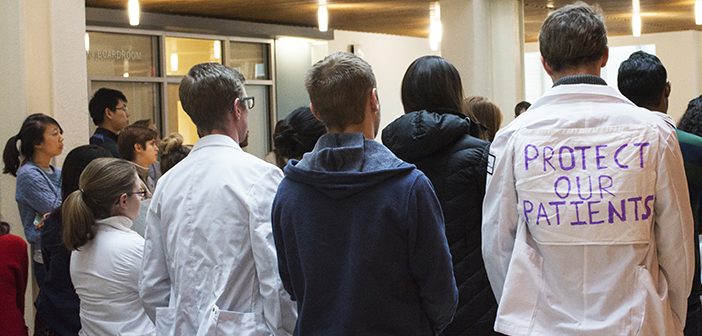The ACA repeal effort inspires medical student activism.
As Congressional Republicans made their first attempt to dismantle the Affordable Care Act in January, a group of Warren Alpert medical students organized a Health Justice Forum to voice their support for the legislation.
Jonathan Staloff ’14 ScM’19 MD’19 spoke at the event about a taxi driver he had seen at a free health screening. “When I pricked his finger, he smiled, and told me that one day his then-12-year-old son would be sitting in my chair, on the path to becoming a doctor,” he said. “I was so flattered I nearly failed to notice that the glucometer read 453 mg/dl.”
Staloff said when he asked the patient which doctor was helping him manage his diabetes, he learned the “true underlying condition: he was uninsured, and had no doctor to treat him.” Staloff referred him to Clínica Esperanza, and a year later, he had received medical care through the expanded Medicaid program under the ACA. It’s patients like these, Staloff said, that inspired him to speak out against repeal.
Matthew Perry ScM’19 MD’19 spoke about his work with an organization that provides health services to young people living with HIV. “For the first time in this disease’s history, our system has the capacity to care for people with HIV, regardless of income status, to the degree that the weight on their backs is lighter,” Perry said. He worried that ACA repeal would put that progress in jeopardy.
Concern about patients losing their insurance has inspired a wave of med student activism across the US, says Natasha Kumar MD’17, who helped organize the forum as well as an effort to urge the Medical School leadership to speak out in support of the ACA.
“Physicians have always been a neutral counterpart in any political proceedings,” Kumar says. “That’s been shifting a lot in recent years, particularly since the [2016] election.”
The ACA, she says, has been integral to the way students view and administer patient care. “We truly are the Obamacare generation,” she says. “My class in particular started college when the ACA was first introduced. This is the framework of our understanding of medicine.”
As Washington grapples with health care reform, medical students will continue to advocate for their patients, Kumar says. “Who we are as a generation of physicians leads us to see the white coat differently than many of our predecessors, leading us to be more vocal,” she says. “This is all part of a bigger picture around issues like gender, like race—a whole host of things that drive inequality in our country that we’re starting to speak up about.”




